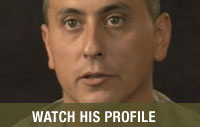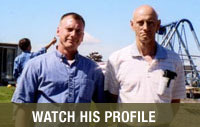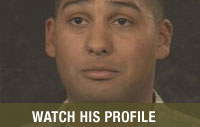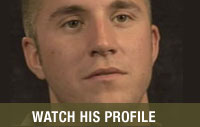Video and text profiles of four of the platoon's members
- Related Link
- Map
Bad Voodoo Platoon is based at Camp Virginia in Kuwait but their convoy security missions take them all over Iraq. Here's a map of some of the places they've been.
Sgt. Jean-Paul Borda
 Jean-Paul Borda, a Virginia Tech graduate with degrees in political science and history, was born in Paris to a Colombian-French father and a Mexican-American mother. His father worked for the government in France for his first four years. After his father's death, his family moved to northern Virginia, just outside of Washington, D.C.
Jean-Paul Borda, a Virginia Tech graduate with degrees in political science and history, was born in Paris to a Colombian-French father and a Mexican-American mother. His father worked for the government in France for his first four years. After his father's death, his family moved to northern Virginia, just outside of Washington, D.C.
At the start of his current tour, J.P.'s family moved from northern California, where his mother grew up, back to Virginia so that his wife could have their relatives' support while she cared for their two sons, ages 6 and 2.
J.P. joined the National Guard in response to 9/11 -- at age 27. "Before that I was 200 lbs., sitting behind a desk, drinking beer, [had] my job and my family," he explains. "So much has changed since then for me. I never pictured myself in uniform. My family still can't believe I'm doing this."
During J.P.'s first tour in Afghanistan (2002), he used his IT background to form a blog called "National Guard Experience," where he wrote essays and posted pictures for his family and friends at home when he couldn't stand in line for the phone. In one entry, he wrote about the Goofy stuffed animal that his son took everywhere with him because Daddy gave it to him -- even buying it popcorn at the movies. Though J.P. only expected his loved ones to tune into his blog, he was soon getting responses from anonymous readers and offers for magazine publication.
"I think [military blogging] is here to stay, despite what everyone says about policy and guidelines," J.P. says. "I think it's great because journalists don't have access to what we can see and what we can do on the front lines. … We're just writing what we're doing. … We've got nothing to sell; we've got nothing to lose."
In 2005, when J.P. returned from Afghanistan, he launched milblogging.com, an aggregator of military blogs from 23 countries, so people could read about the experiences of soldiers, veterans and soldiers' families. There are more than 1,500 military blogs indexed on his site. His own blog has been featured in The New York Times and The Washington Post.
J.P. also built and maintains the Bad Voodoo Platoon Web site, where there is more about the men and links to their personal Web sites or MySpace pages, as well as lists of things they'd like to receive in care packages.
After J.P. saw director Deborah Scranton's documentary The War Tapes in 2006, he became interested in finding a way to tell his platoon's story. He and Scranton e-mailed for nearly a year before they began to develop a plan to send J.P.'s platoon on tour in Iraq with cameras. [Watch a video on the making of the film.] J.P. can be e-mailed at: jeanpaulborda at yahoo.com.
Sfc. Toby Nunn
 Toby Nunn grew up in Terrace, northern British Columbia, just south of the Alaskan Panhandle. It was little more than a large logging center in the middle of the wilderness. He was raised by his father, who had grown up on the prairies and from age 12 had worked in lumber camps to provide for his family. "He's an extraordinary guy -- a single father working a pretty rough job up in the woods," Toby says. "Not your typical man. Never missed a soccer game, never missed a hockey game -- worked and made everything happen." Toby's father continues to be his role model and hero.
Toby Nunn grew up in Terrace, northern British Columbia, just south of the Alaskan Panhandle. It was little more than a large logging center in the middle of the wilderness. He was raised by his father, who had grown up on the prairies and from age 12 had worked in lumber camps to provide for his family. "He's an extraordinary guy -- a single father working a pretty rough job up in the woods," Toby says. "Not your typical man. Never missed a soccer game, never missed a hockey game -- worked and made everything happen." Toby's father continues to be his role model and hero.
Toby moved to the United States as a teenager. He wanted to pursue a degree but couldn't afford it, so he joined the Army -- in part for the education benefits, but also because the military represented for him the values of integrity and honor that his father had taught him. As a Canadian, he could not go the officer route; the enlisted route was his only option.
Toby joined a mechanized infantry unit as a young private and was sent to the Balkans, where he earned a nickname that inspired the name of Bad Voodoo Platoon. "I got a nickname back in the Balkans," he explains, "through an event where a Muslim and a Christian were arguing. They felt like I might not be neutral, and I told them I didn't care either way what religion they were. It had nothing to do with mine. I told them I was voodoo." His next overseas deployment was to Korea, then multiple times to Iraq for Operation Iraqi Freedom.
Toby believes the biggest gift he has to give his men is opportunity: "I'm willing to put that mantle of leadership on other people and give them the opportunity to learn the lessons that I learned, because sometimes the inner self is the best teacher out there."
As an enlisted man, he likes to stay in the trenches with the men he leads, and watch their progress. "We're asking extraordinary things from ordinary people," he says. "It's inspiring to watch, especially when you see that young, 19- or 20-year-old boy, who, if he was in America, the only things that would be on his mind would be kegs, fast cars and girls. And now he's thinking about the big picture: running water, sewage plants, welfare children, school supplies."
Being a leader leaves Toby emotionally isolated at times. "You've got to be careful where you emotionally release as a leader because you don't want your moment of weakness to cost another soldier a moment of strength," he says. He carries his son's old Tickle Me Elmo on tour as a daily reminder of what is most important to him: "We had this thing when he was younger. When we were together, he would have his Tickle Me Elmo, and when we were apart, I would have it. He just thought I needed it or something."
A father to two boys and a daughter, Toby says if he could change anything, he wishes that he'd had this experience before he had children. "That way they'd be completely sheltered from it," he says. Toby can be contacted through his Web site: www.tobynunn.com.
Spc. Jonathan Serbellon
 The middle of three brothers, Jonathan grew up in the Mission District of San Francisco. His mother worked as a waitress and his father was a longshoreman, so Jonathan spent much of his childhood with his maternal grandmother, who was Mexican and did not speak English. Jonathan did not speak English until he was 8 years old. He credits his grandfather, a Merchant Marine, for teaching him values. Jonathan's father immigrated to the United States to escape war in El Salvador, where many of his family members were killed.
The middle of three brothers, Jonathan grew up in the Mission District of San Francisco. His mother worked as a waitress and his father was a longshoreman, so Jonathan spent much of his childhood with his maternal grandmother, who was Mexican and did not speak English. Jonathan did not speak English until he was 8 years old. He credits his grandfather, a Merchant Marine, for teaching him values. Jonathan's father immigrated to the United States to escape war in El Salvador, where many of his family members were killed.
Jonathan liked school, but by the 10th grade found that most of his learning occurred during his independent studies because of the distractions of the gang violence that infiltrated his school and neighborhood.
"Our city's broken down in three sections," he explains. "So if you live in that part of town, just cause you live there, they'd beat you up. You either belong to somebody or you're going to get hurt every single day until you get protection. So you lose either way. You've got to find out how to work with the system and use it to your advantage. I had fallen in with a group and it wasn't an easy choice, but I had to. Gangs are like a military because you're going to join them and they're going to protect you. I was always … threatened to get killed. I had been stabbed once. I got protection for awhile, until I started getting strong enough to make friends on both sides of the fence."
Though he hasn't had the chance to go to college himself, Jonathan now helps to pay for the education of his 19-year-old brother, who is studying to become a doctor.
During his leaves from the military, Jonathan often visits his mother's family in Mexico and puts his construction knowledge to work, building houses. "My money goes a lot further down there than it does up here, so I go down there and just help build a lot of homes," he explains. "Make a life a bit better than what it is. … I'm not scared down there. I don't have to worry about people looking at me, because I'm not from there."
When Jonathan was 17 years old, he became a father. His son's name is Jonathan Serbellon II, nicknamed "Junior." He remained with his son's mother for a year and then they broke up. Jonathan describes him as a kind kid, a friend and an avid athlete who plays baseball and basketball, is on the swim team and is now considering following Jonathan's footsteps in soccer.
"Being 17 years old and being a parent made me grow up really quick," he recalls. When I was 17, I was very selfish. I wanted to pursue my goals. I wanted to be a kid. I got offered a scholarship to Sacramento State to play soccer for them, but I had to turn it down because I had to work. So him being born, it made me face hard situations that I couldn't run away from because it affected my boy."
Jonathan completed an apprenticeship at an ironworker's union when he was 21, then he joined the Army. This is his first deployment to Iraq. "They need bodies to protect each other, so that's pretty much why I joined," he explains. "I see these people protesting, 'Bring them back, bring them back.' I'm like, instead of protesting, why not go over there and help bring them back? I don't want to be a sign-holder. I want to be a guy that holds my friend's hand, bring him back."
"Me going over there, my first time, it's very nerve-wracking for me," he admits. "My fears are being there, losing my friends, ... not coming back to my son. He's scared his dad is going over there. He doesn't want me to go. He tells me every day he supports me but I can tell he's scared."
Jonathan hopes that by participating in Bad Voodoo's War, he can help people relate to soldiers: "They'll say, 'Hey, I can relate to this guy. This guy has three kids at home. He works, too; he's a mechanic, just like me. The only difference is that he's in Iraq and I'm not.'"
Spc. Jason Shaw
 Originally from Houston, Texas, Jason Shaw joined the Army when he was 17. Now 22, this current tour is his third deployment to Iraq. His previous tour was with Sfc. Toby Nunn, although they were not in the same unit. Jason's acquaintance with Toby was a factor in his decision to volunteer to go back to Iraq. He felt he would be in good hands with Toby as his platoon sergeant.
Originally from Houston, Texas, Jason Shaw joined the Army when he was 17. Now 22, this current tour is his third deployment to Iraq. His previous tour was with Sfc. Toby Nunn, although they were not in the same unit. Jason's acquaintance with Toby was a factor in his decision to volunteer to go back to Iraq. He felt he would be in good hands with Toby as his platoon sergeant.
Jason has lost six friends in Iraq. In his last deployment, he lost one of his best friends, a new father to a 3-month-old daughter. When Jason returned, he moved to California to help his friend's widow put things back together. In an interview he explained, "I'm Uncle Jason and I'm always going to be there, just watching them grow up, wishing he could see."
After Jason's last tour, he was diagnosed with Post-Traumatic Stress Disorder (PTSD). He vacillated between feeling numb and a short, hot temper. He hopes that if he can keep his head in the right place during this deployment, the healing process he's struggled to begin will not fall apart. He feels that by volunteering for another tour, however, that he is doing what he can to "bring [the troops] home."
Jason's mother died when he was six, but as a child he was an outgoing jokester. As he got older, he began to get into trouble. He dropped out of high school after his sophomore year, got his GED, then joined the military as soon as soon as he turned 17. After falling in love at 19, Jason got married and deployed to Iraq. While he was away, his marriage unraveled and he got a divorce when he got home. Eventually he hopes to have children of his own.
When he was 18, Jason fought in the battle for the Baghdad airport during the 2003 invasion of Iraq. In that battle, he helped to blow up three tanks while under fire from multiple directions. Jason can be contacted at jasonbadvoodoo at yahoo.com
[Editor's Note: FRONTLINE had mistakenly reported that Spc. Jason Shaw received a Silver Star for his role in the battle at the Baghdad airport during the invasion of Iraq. We regret the error.]





